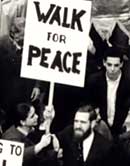|
Conscientious objection has a unique place in United States history. In fact, the tradition of refusing military service - and the recognition of that right - can be traced back to America's founding fathers, some of whom were pacifists fleeing oppression for their beliefs in Europe. Several of the original colonies, including Pennsylvania, Delaware and New Jersey, were founded by the Quaker pacifist William Penn.
The framers of the U.S. Constitution even considered including an exemption from military service for conscientious objectors in the Second Amendment. This clause was omitted because they did not envision the need for creating a standing army.
At the onset of the Revolutionary War, George Washington issued a draft order, which was a call to "all young men of suitable age to be drafted, except those with conscientious scruples against war."
During the American Civil War, the conscription law of the North provided the opportunity for religious objectors and others to buy their way out of the draft. Those who refused or could not afford that option were treated harshly under military law. Four thousand men served in the military as unarmed legal conscientious objectors (COs).
World War I ushered in the first draft since the Civil War, and policies that were even less tolerant of conscientious objectors. Seventeen draft resisters died of mistreatment in Alcatraz Prison during World War I.
| |
 Easter Walk for Peace converging on U.N. |
In World War II, a total of nearly 43,000 Americans refused to fight for reasons of conscience: 12,000 served in Civilian Public Service, 6,000 went to prison and 25,000 served in the military as noncombatants. During the Vietnam War more than 170,000 men were officially recognized as conscientious objectors. Thousands of other young men resisted by burning their draft cards, serving jail sentences or leaving the country.
Though the military is currently an all-volunteer organization, when the Gulf War broke out in 1991, 2,500 men and women volunteers serving in the Armed Forces refused to serve in Saudi Arabia on the basis of conscience. While draft opposition has been an individual decision made by a minority in all U.S. wars, public opposition to wars such as the War of 1812, the Mexican War, World War I and the Vietnam War sparked mass movements that reached far beyond men of draft age.
All photos on this page courtesy of the War Resisters League
|
